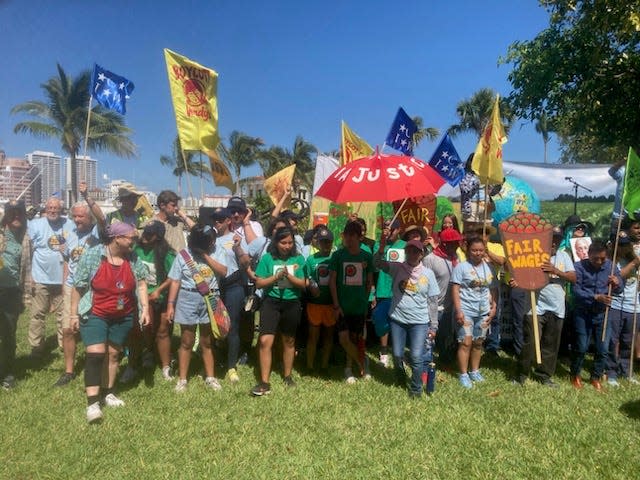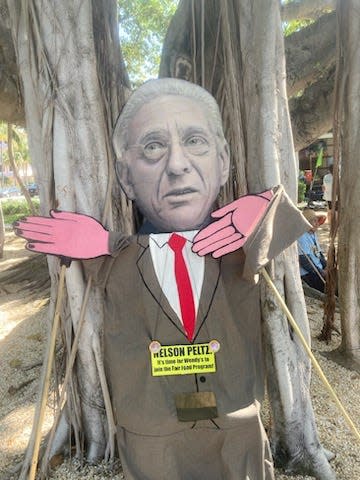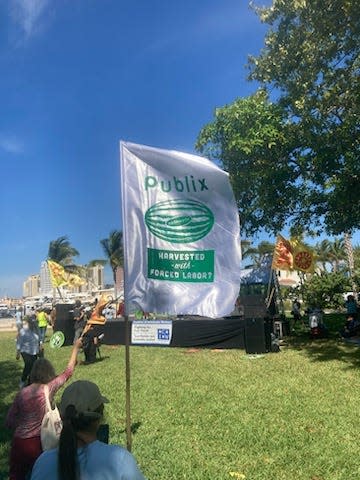Farmworkers march in Palm Beach, calling for better wages, conditions

PALM BEACH — More than 300 farmworkers and supporters marched last weekend through a town with multimillion-dollar homes to call attention to businesses they say are not doing their part to end forced labor on farms.
At Lake Drive Park, where the march began around 11:30 a.m., the contrast was particularly stunning. Farmworkers barely able to earn living wages complained about working conditions on farms where $20 million-plus yachts were docked within hearing distance of their speeches.
One of the reasons for choosing to end the march in Palm Beach was because Wendy's Board Chairman Nelson Peltz lives there. Wendy’s, Publix and Kroger are among the businesses that have thus far refused to join the Fair Food Program, whose goal is to end worker abuse on farms.
The sponsors of the march, the Coalition of Immokalee Workers, developed the program after finding what they say were far too many cases of abuse, wage theft and sexual harassment.
The coalition has persuaded dozens of businesses such as McDonald’s, Walmart, Trader Joe’s and Subway to participate in the Fair Food Program. The farms associated with them must maintain certain standards to ensure that farm workers are not abused. The Fair Food Program allows workers to complain about working conditions without fear of retaliation.
More:Nearly 1M Florida residents may lose their health care starting April 1. Why?
More:WPB adult entertainment spot, Delray pizza parlor temporarily close for failing inspection
The coalition thus far has been unable to persuade Publix, Kroger and Wendy’s to participate, and those companies were the target of the coalition’s protest Saturday as workers held signs calling for people to boycott them.
According to the coalition, “two parallel worlds exist side-by-side within the farming community: the world of freedom from abuse on farms in the program and the world of harsh exploitation outside its protections.”
Lupe Gonzalo, 42, said she once worked on a farm that was not part of the program. It agreed to participate or else the business that bought its product would end its relationship with the farm operator.
“The difference was like night and day,” she said. “Before I had wages withheld. I had trouble getting water on hot days. We were not able to take breaks. That all changed once the farm became part of the program.”

Gonzalo, speaking through an interpreter Saturday, said the changes were “nothing short of remarkable.” She is now leader of the program’s worker-to-worker education team. She lives in Immokalee.
Marchers walked through the town to Bradley Park. Speaker after speaker called for a boycott of businesses that refuse to participate in the program.
U.S. Rep. Lois Frankel, D-West Palm Beach, also urged the businesses to join the Fair Food Program, but said she was not advocating a boycott.
“I think they should participate. There is no downside, only an upside,” she said, “but I’m not calling for a boycott.”

Saturday's march garnered support from farmworkers throughout Florida and from as far away as Vermont. Attendees wore T-shirts calling for “Justice for Farmworkers."
The coalition argues that The Fair Food Program has helped transform Florida’s tomato industry from what federal prosecutors dubbed “ground zero for modern-day slavery” before the program’s launch in 2011, organizers said.
A Wendy's spokeswoman told the Palm Beach Daily News and Palm Beach Post last week that the company sources food such as tomatoes "exclusively from indoor, hydroponic greenhouse farms," while the Fair Food Program operates in outdoor tomato-growing and harvesting environments.
More:What are the best waterfront restaurants in Florida? 15 favorites for food, drinks and fun!
More:Jupiter is planning for three big changes to help ease traffic on its busiest road
Wendy’s, in a prepared statement, said it has established a Supplier Code of Conduct that applies to its significant suppliers. It requires "third-party reviews related to the human rights and labor practices for suppliers of certain hand-harvested, whole, fresh produce such as tomatoes. The idea that joining the Fair Food Program, and purchasing field-grown, commodity tomatoes, is the only way that Wendy’s can demonstrate responsibility in our supply chain is not true."
But the coalition argues that workers can be mistreated inside a greenhouse as easily as they can on a farm.
Publix maintains that the Coalition of Immokalee Workers is pressuring it to become involved in the employment relationship between Florida farmers and farmworkers. "Since first approached by the coalition in 2009, we have consistently viewed this issue as a labor dispute, and our position remains the same today," said a Publix spokeswoman.
Coalition organizers cited a case in Bartow in Polk County where a labor contractor pleaded guilty to forced labor charges on a farm. Workers were allegedly housed in unsafe and unhealthy living conditions.
On Dec. 29, 2022, a federal judge sentenced the contractor to 118 months in prison and order it to pay more than $175,000 in restitution to the victims. The prosecution is part of an investigation begun in 2017 by federal agencies in several states. Workers who escaped their unhealthy living and forced labor conditions first reported the violations to the Coalition of Immokalee Workers.
The defendant, according to the Department of Justice, forced Mexican agricultural workers to labor under inhumane conditions, confiscated their passports, imposed exorbitant fees and debts, and threatened them with deportation or false arrest.
The 2016 march generated controversy because of geographic limits Palm Beach had set on the march. In the end, about 500 people protested through town streets on March 12 of that year, and the town later paid more than $160,000 in attorneys' fees and costs after a federal lawsuit filed by the march organizers.
Saturday’s march was peaceful. Several police officers helped guide the marchers through the town.
Mike Diamond is a journalist at The Palm Beach Post, part of the USA TODAY Florida Network. He covers Palm Beach County government and transportation. You can reach him atmdiamond@pbpost.com. Help support local journalism. Subscribe today.
This article originally appeared on Palm Beach Post: 300 farmworkers protest field conditions during Palm Beach march

